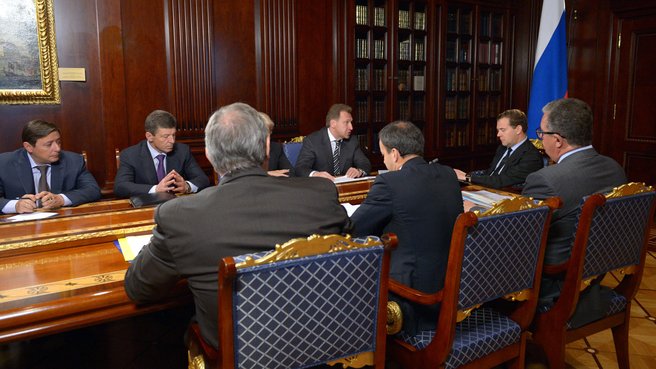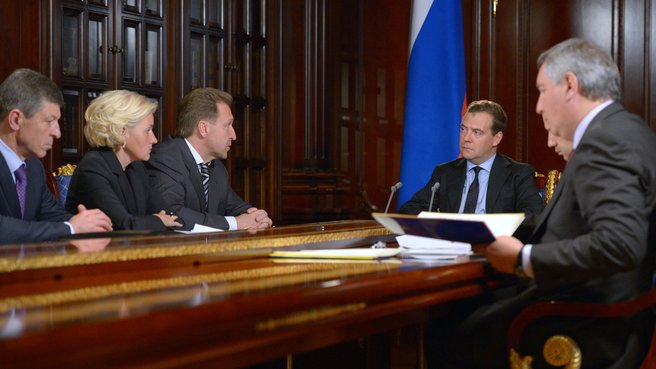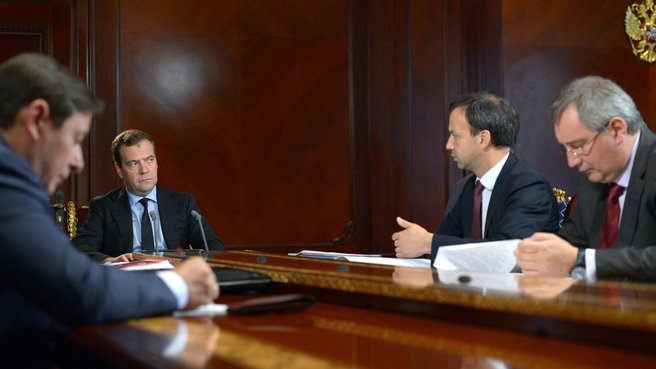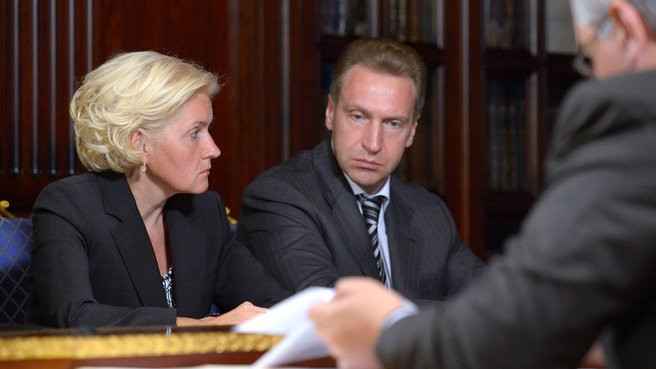Transcript of the beginning of the meeting:
Dmitry Medvedev: I’d like to say a few words before we get to work. I will begin with foreign economic issues. The regulation of foreign economic activity is a very important issue and a major component of our competitiveness. Currently, our foreign economic revenues account for nearly 40% of federal budget revenues.
In March we discussed the federal programme on Promoting Foreign Economic Activity. I have approved a schedule for its implementation, complete with deadlines and officials responsible. I therefore hope that its implementation will produce the desired effect, especially because our key priority is to promote economic integration within the framework of the Customs Union and the Common Economic Space. We must complete the development of a full-scale market, as we have agreed to do with our partners, and move on. Mr Shuvalov, you are responsible for this programme. Will you please report on its progress?
Igor Shuvalov: Mr Medvedev, in accordance with the approved schedule, which you signed on June 29, we are tasked with implementing a variety of measures by 2018 aimed at developing a new infrastructure for our foreign economic activity. The programme comprises six subprogrammes, including on customs formalities, the development of checkpoints on the state border and also the formation of the Eurasian Economic Union, which is scheduled to start working on January 1, 2015.
Taken together, this should increase our foreign trade considerably and ensure the development of a fundamentally new export potential by 2018. Russia’s exports are to increase by 60%, with the export of raw materials growing more slowly than the non-commodity exports. This is one of our targets based, in part, on our plans to modernise the Russian economy and to reduce its dependence on foreign commodity markets.
The list of measures includes the establishment of customs checkpoints in the Far East and also new border stations, which is an issue of major concern and a source of numerous complaints from foreign trade participants. At the same time, trade with the West must be promoted while trade with the East – Asia-Pacific countries – must be expanded considerably.
The specific measures in this plan include not only the ministries and agencies responsible, and above all the Ministry of Economic Development, but also stipulate those responsible for fulfilling individual measures, as well as related agencies, including the Federal Customs Service.
Mr Medvedev, in accordance with this programme, we must increase the share of machinery, equipment and transport vehicles in Russia’s exports. It also sets out concrete figures for the work of exporting organisations: the number of companies with free access to the export infrastructure is planned to increase to 54,000. The programme also stipulates a special instrument for interdepartmental coordination, because this work involves many departments.
It should be said that the programme, which was discussed in March, is based on the assumption that there will be no major shocks on global markets. However, even if such shocks were to take place, we must keep working to maintain Russia’s export potential. Therefore, we should view this as an additional growth incentive.
But we have to keep in mind that if such upheavals happen we must in any case support Russia’s export potential, because that provides another incentive for growth.
As regards export support institutions, particular attention is paid to Vneshekonombank and its subsidiary, the Export Credit Insurance Agency EXIAR. It is a working agency, and you know that in our meetings with you we have considered issuing an additional 500 billion roubles in guarantees to be able to insure major transactions. Just recently we reported on the activities during the past year: on the whole the Agency has managed not only to establish partner relations with major insurance organisations in Europe, but also to enter the Asian market. The first such deals have been signed and insured.
Overall this action plan will enable us to monitor execution, and we may have some concrete results by the programme’s expiry date in 2018.
Dmitry Medvedev: It would be desirable to see concrete results before 2018. I hope we will.
Igor Shuvalov: These are annual indicators, and of course we will consider the results. Because we review the results of foreign economic activities at Government meetings every year, we will report to the Government as a whole, but we expect to achieve the aggregate indicators I have reported now within the five-year cycle.
Dmitry Medvedev: Another document I signed recently deals with the federal fund of reserve areas of subsoil. Arkady Dvorkovich, you are in charge of this – could you tell us how decisions will be made against including certain areas in the reserve? This has been a matter of a lot of intrigue and controversy. Who will be using these reserve areas subsequently?
Arkady Dvorkovich: The need to reserve is sealed in the federal law passed back in 2008. There have been a lot of arguments as to what criteria should be used and why it is necessary to reserve areas of subsoil. The main aim is to provide the state with the necessary reserves of strategic raw materials in the long term. We are talking about fields containing oil, gas, uranium and deposits of rare metals and other minerals.
The main argument for including areas in the reserve category is that for whatever reason, it makes no economic sense to develop them now. It may be a defective infrastructure or a lack of technologies for developing these resources with the best economic effect. Furthermore, reserve territories will include areas in protected natural territories and on the continental shelf of the Russian Federation. The Ministry of Natural Resources will make the decision to include or not to include specific areas in consultation with all the scientists and experts at the Academy of Sciences and in industry. If a criterion ceases to be relevant (new technologies become available, or the market situation makes it possible to develop these fields or it becomes clear that the state needs to develop these areas), the Ministry of Natural Resources makes a submission to the Government to strike the area off the list of reserve areas and to put it up for tender or auction.
Dmitry Medvedev: Okay. Make sure that everything is done according to the rules, because it is an issue that calls for particular attention.
Another topic has to do with the summer season and incidence of diseases. Of late there has been a lot of talk about serous meningitis, there are pockets in ten regions. The worst hit were the Rostov Region and the Lipetsk Region. Unfortunately, there are some fatal cases, and children are becoming victims. This is not something entirely new, it is quite a common situation in summer, but we must step up diagnostic work and do more to trace the channels through which the disease is spread, and to control the quality of water and food that children consume during the summer holidays. So the sanitary-epidemiological agencies and the law enforcement agencies should carry out the necessary checks, because by no means is everything done properly everywhere, and that, incidentally, includes medical care.
I have asked the Healthcare Minister to visit the Rostov Region to look into the situation there, but we should keep the entire situation under control. Mrs Golodets, would you like to tell us what is being done in this regard?
Olga Golodets: The situation is more or less back to normal, because out of the 253 people who got sick in the Rostov Region, none are in hospitals or in intensive care. There were two cases with a fatal outcome, but all the other children have been sent back home and the diagnosis have been lifted. But the epidemiological situation is being monitored and a team of doctors has been sent to the Rostov Region who know how to work with the strains that are uncommon in the region. The strain has been imported from the People’s Republic of China, and we have doctors in Russia who have managed to stop the spread of the disease in the Rostov Region. We hope there will be no new cases. It is an ongoing situation in the Lipetsk, Voronezh, and Moscow regions, in the city of Moscow, in the Volgograd, Kursk, Astrakhan and Nizhny Novgorod regions. Children are still in healthcare institutions. All the personnel, especially at the primary and outpatient level, have been instructed on how to identify the disease, because the outward symptoms are often similar to an ordinary respiratory infection. All the medical services have been alerted so that they could quickly detect a case and provide timely assistance. In all the summer camps where many children are on holiday together, the food is strictly controlled: consumption of raw vegetables and fruit in the places where there have been outbreaks has been limited. That is a forced measure to prevent the spread of the disease. However, in the overwhelming number of children’s camps, the summer is going well and everything is fine. I have to remind you that we have 8.4 million children in holiday camps this summer. Today the sanitary epidemiological situation and, also very important, the level of awareness, the educational programmes in the overwhelming majority of camps, are at a high level.
Monitoring of compliance with sanitary and epidemiological regulations is normal. In accordance with these rules the activities of three camps in the Russian Federation have been suspended (they are putting these places in order and for the next shift of children the conditions will be normal). These camps are located in the Tomsk Region, the Omsk Region and there is one camp in the Tver Region.
I hope that with the start of the new shift all the camps will be back to normal.
Dmitry Medvedev: Very well. Keep the situation under control together with the Ministry of Healthcare. Thank you.
<…>
















